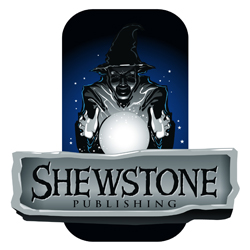2020 was a tough year for many. I’m pleased to say, Shewstone Publishing weathered the year pretty well. We’re continuing to mature as a company and to grow our audience. Tell your friends about us!
Crowdfunding Success!
Thanks to 132 awesome backers, we successfully funded Magonomia® Core Rules in April! If you missed your chance to back it then, we are still accepting late pledges and they can still help us reach level-up goals. Thanks again to our backers who believed in us! Also our friends at Game on Tabletop deserve a shout out for all they did to mentor me and set me up for success.
This was our first-ever successful crowdfunding campaign, so that’s a very big deal. I admit the amount we raised is not enough to fully cover production costs, but it pays for a big chunk of the artwork. The support of our backers means so much. It tells me there’s an audience for our game: people are going to meet up with their friends and play wizards in Enchanted England. This is going to happen — because of our backers.
At the end of 2019, Shewstone was a third-level publishing company. (We’re using milestone based advancement from 5E, even though we don’t make 5E games at this time.) Reaching our funding goal during a pandemic leveled us up again. Welcome to level 4! (I put my stat increase into Wisdom.)
Magonomia® Release Date: Summer 2021
We have a release date for Magonomia Core Rules: May 31, 2021. We were aiming for end-of-November 2020 but I had to slip that date backward by six months. The Covid-19 pandemic had some impact on development — freelancers’ availability was affected — but my inexperience was a bigger factor. I thought because we had written a lot of words, the manuscript was closer to complete than it was. We’ve now recovered from that mistake and we’re working steadily toward a realistic release date. You can track our progress on the project’s Trello board.
The setback has a silver lining. Author Timothy Ferguson, my friend and colleague from my days freelancing for Ars Magica, was able to join the project and to write a couple of key chapters. His passion for history, folklore, and historical magic have made their mark on the game. Combined with the contributions from CJ Romer, excellent rookie designer Tom Nowell, and Vesna Gronosky, we have a big, ambitious manuscript full of solid play advice, historical flavor, and authentic lore. Our magic potion is nearly done!
I won’t claim credit for leveling up again until the Core Rules are out to door, but the goal is in sight!
Missed Gen Con 2020
When Gen Con 2020 was forced to move online, it was a blow. I admit I didn’t take it as well as I could hae done. I got depressed and I backed Shewstone Publishing out of the convention entirely. At the time, I was cramming to try to get Magononmia done for the original fall 2020 deadline. It was a mistake not to participate.
We’re very eager to return to Gen Con. If it’s online again, Shewstone Publishing will be back with a roar! We can’t commit to an in-person convention in 2021 until we see how the pandemic plays out.
2021 Events
We’re starting off in January with a monthly series of actual play videos of Magonomia. Sign up if you want to be a player in our videos!
We’ll be resuming the Tales of Renaissance Wizardry blog series of free adventure starters. This was always planned to be monthly but we seem to have slipped in November … and December. Keeping it going regularly is our 2021 New Year’s resolution!
We’ll be adding a monthly podcast on adventure design to accompany the videos and blog posts. Here’s how they fit together. First we play the adventure. Then we post the plot outline to the blog. Then on the podcast, the GM talks about what it was like running the adventure based on the outline provided.
Our convention schedule is not decided yet. Follow us for updates.
2021 Product Schedule
Spring or early summer: Curse of the One-Eyed Witch, Revised Edition. Still pay-what-you-want, but with updated content, professional layout, and beautiful black-and-white artwork by Teresa Guido and Colin Throm.
Summer 2021: Magonomia Core Rules delivered to backers, then offered on DriveThruRPG and other outlets for general sale.
Fall 2021: Tentative date for publishing our tried-and-true convention adventure, Queen Elizabeth’s Astrologer is Missing!
Follow Us
To keep informed of all the great stuff we are doing — videos and podcasts, free adventure starters, online games and events, plus news of upcoming products, you can subscribe to our email list or follow us on social media: Facebook, Twitter, Discord, MeWe


